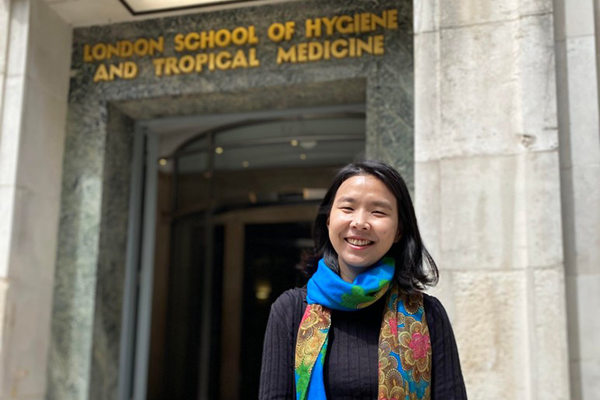
By Eunji Cho, 2020-21 Rotary Scholar from District 3640 (Korea)
Vanuatu is a small island nation in the South Pacific, comprising approximately 300,000 people spread across 83 islands. It has natural beauty and tourist appeal. Yet residents often have difficulty accessing quality health care. Reaching medical facilities often requires hours of boat travel, and even then, there is a shortage of healthcare professionals.
Vanuatu is also susceptible to natural disasters like earthquakes, tsunamis, cyclones, volcanic eruptions, and the effects of climate change. All of these impact residents’ health. When a cyclone struck in March, the capital was without water and power causing waterborne diseases to spread in the humid climate and among close-knit family units.
As a 2020-21 Rotary Scholar with a master’s degree in International Health, I work in the World Health Organization’s office in Vanuatu assisting the ministry of health in improving access to quality healthcare. I help with a community-based public health program that trains members of the community to serve as primary healthcare workers. The aim is to enable residents to receive prompt emergency care or basic treatment near their homes, eliminating the need for lengthy boat rides. It is similar to the role that community volunteers play as frontline health workers in the fight to eradicate polio.
The event that changed my career trajectory
I first developed an interest in international development during my undergraduate work. After graduation, I began working in overseas project support at an international NGO called Good Neighbors. I was dispatched to countries like Nepal, Thailand, and Tajikistan, where I worked on projects related to health, education, and water and sanitation hygiene. It was in Tajikistan that something happened to alter the trajectory of my entire career.
One day, a colleague’s newborn baby fell ill with a heart condition. The colleague drove for five hours on winding mountain roads to reach a hospital, only to be informed that the child’s condition was untreatable. The baby passed away in my colleague’s arms on our way back down the mountain.
As I attended the funeral, I thought about the pressing need for healthcare in developing countries. I became convinced that these problems could be addressed, and I felt a personal responsibility to contribute. In a more developed country, with the better healthcare infrastructure, and access to equipment, my colleague’s baby could have been treated. I was motivated to focus on the field of public health and make a difference.
During the next year, while working at UNICEF’s country office in Uganda planning and supporting health projects, my desire grew stronger to acquire specialized knowledge in international health. In the Rotary District 3640 newsletter, I read information about scholarships through The Rotary Foundation’s global grants which could help me with the cost of tuition.
I was familiar with The Foundation through my work in international development. When I explored Rotary’s areas of focus on the Rotary website, I realized that Rotary’s mission aligned with my past work and future aspirations. This gave me the confidence to apply.
I reached out to District 3640 and established connections with the Rotary Club of Seoul Gangdong. Rotarians there had experience supporting Rotary scholar applicants and generously assisted me throughout the process, from preparing documents to settling in London. Thanks to their support, I received a full scholarship which included living expenses.
A year of connection and growth

At the London School of Hygiene & Tropical Medicine, I majored in Public Health for Development. Many colleagues I worked with at UNICEF and WHO had studied there, and it is one of the most prestigious institutions in the field of international health.
Over a year, I had the opportunity to study epidemiology, health statistics, health economics, and other subjects with 30 classmates from diverse backgrounds and nationalities. During seminars where we debated public health topics, I had the chance to present on community-based public health. It is a method that involves training members of the community as public health workers in developing countries. I enriched my knowledge greatly by learning the theory, sharing various field experiences, and actively participating in this program.
However, the most valuable aspect of my master’s degree was the people I met. As the program required at least three years of public health work in developing countries for admission, all my classmates were professionals who had worked in UN agencies, NGOs, academia, or health ministries from various countries. Simply hearing their stories indirectly expanded my knowledge and experience. Despite COVID-19, I regularly met with my classmates, and we continue to stay in touch through messaging apps.
Furthermore, the sponsoring Rotary club in Korea and the hosting Rotary club in England consistently checked on my well-being, ensuring I was adapting well and offering assistance when needed. Particularly, the Rotary Club of Leytonstone and Woodford went above and beyond, welcoming me at the airport upon my arrival and inviting me for meals at Korean restaurants and their homes during the semester.
I would like to express my deep gratitude to the sponsoring district and Rotary clubs that supported me unconditionally throughout my educational and career development journey. I also extend my heartfelt thanks to The Rotary Foundation and Rotary members for enabling me to make a more significant impact on the world through my profession.
Read this post in Korean on Naver
https://blog.rotary.org/2023/09/27/rotary-scholar-transforms-lives-through-public-health/
